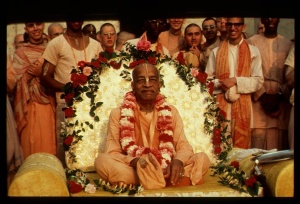CC Adi 16.52: Difference between revisions
No edit summary |
(Vanibot #0054 edit - transform synonyms into clickable links, which search similar occurrences) |
||
| Line 17: | Line 17: | ||
<div class="synonyms"> | <div class="synonyms"> | ||
''nāhi paḍi'' | ''[//vanipedia.org/wiki/Special:VaniSearch?s=nāhi&tab=syno_o&ds=1 nāhi] [//vanipedia.org/wiki/Special:VaniSearch?s=paḍi&tab=syno_o&ds=1 paḍi]'' — I do not study; ''[//vanipedia.org/wiki/Special:VaniSearch?s=alaṅkāra&tab=syno_o&ds=1 alaṅkāra]'' — the art of literary embellishment; ''[//vanipedia.org/wiki/Special:VaniSearch?s=kariyāchi&tab=syno_o&ds=1 kariyāchi]'' — I have done; ''[//vanipedia.org/wiki/Special:VaniSearch?s=śravaṇa&tab=syno_o&ds=1 śravaṇa]'' — hearing; ''[//vanipedia.org/wiki/Special:VaniSearch?s=tāte&tab=syno_o&ds=1 tāte]'' — by that; ''[//vanipedia.org/wiki/Special:VaniSearch?s=ei&tab=syno_o&ds=1 ei] [//vanipedia.org/wiki/Special:VaniSearch?s=śloke&tab=syno_o&ds=1 śloke]'' — in this verse; ''[//vanipedia.org/wiki/Special:VaniSearch?s=dekhi&tab=syno_o&ds=1 dekhi]'' — I see; ''[//vanipedia.org/wiki/Special:VaniSearch?s=bahu&tab=syno_o&ds=1 bahu]'' — many; ''[//vanipedia.org/wiki/Special:VaniSearch?s=doṣa&tab=syno_o&ds=1 doṣa]'' — faults; ''[//vanipedia.org/wiki/Special:VaniSearch?s=guṇa&tab=syno_o&ds=1 guṇa]'' — good qualities. | ||
</div> | </div> | ||
Latest revision as of 18:33, 19 February 2024

A.C. Bhaktivedanta Swami Prabhupada
TEXT 52
- nāhi paḍi alaṅkāra, kariyāchi śravaṇa
- tāte ei śloke dekhi bahu doṣa-guṇa
SYNONYMS
nāhi paḍi — I do not study; alaṅkāra — the art of literary embellishment; kariyāchi — I have done; śravaṇa — hearing; tāte — by that; ei śloke — in this verse; dekhi — I see; bahu — many; doṣa — faults; guṇa — good qualities.
TRANSLATION
“Certainly I have not studied the art of literary embellishments. But I have heard about it from higher circles, and thus I can review this verse and find in it many faults and many good qualities.”
PURPORT
The statement kariyāchi śravaṇa (“I have heard it”) is very important in the sense that hearing is more important than directly studying or perceiving. If one is expert in hearing and hears from the right source, his knowledge is immediately perfect. This process is called śrauta-panthā, or the acquisition of knowledge by hearing from authorities. All Vedic knowledge is based on the principle that one must approach a bona fide spiritual master and hear from him the authoritative statements of the Vedas. It is not necessary for one to be a highly polished literary man to receive knowledge; to receive perfect knowledge from a perfect person, one must be expert in hearing. This is called the descending process of deductive knowledge, or avaroha-panthā.